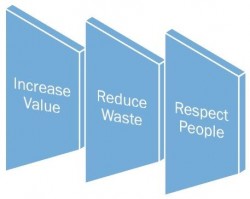There are Three Pillars at the core of Lean thinking: Increase Value, Remove Waste, and Respect People. We examined the first two pillars in past articles, Value-Added/Non-Value-Added and Seven Forms of Waste. The third pillar explains the ecosystem of people and process that is fundamental in supporting the Three Pillar system.
The principle of “Respect People” is a crucial, but often overlooked element of successful Lean thinking. Without respecting, involving and drawing upon the expertise of employees who perform the work every day, you overlook the most fertile source of practical and ready-to-implement suggestions for improvement.
In “What can sustainability pros learn from Toyota’s ‘lean’ process?” Ben Chandler, vice president at Haley & Aldrich, says that “by engaging people in the process of problem solving, it reduces resistance to the recommended solutions. Rather, participants want to see their ideas implemented and be successful because they are their ideas. Lean is inclusive; it is not done to people, it is done by people who feel empowered to create value.” [emphasis added]
Solar is a young industry. At least 50 percent of installation companies have 10 or fewer employees, according to the 2014 Solar Census. Many small companies perceive Lean thinking as a luxury that only large companies can afford. Whether your company size is two or 2,000, your employees are a key pillar in creating value. Are you spending time and energy helping them to develop, listening to their suggestions and empowering them to bring ideas forward? Or are you managing your employees from a safe distance? Lean thinking rejects the latter philosophy and encourages management to engage with employees and process flow where the work is done. This is known as the “gemba attitude” or the “Go And See” technique of observing and interacting with work where it is taking place. It’s easy to fall into the trap of seeing numbers that need control. Do those numbers correspond to actual value creation?
In the late 1990s to early 2000s, the on-boarding process into off-grid solar was like a guild system or learning a martial art or a trade. Solar “apprentices” studied with a “master,” then became “journeymen” and eventually became the “master.” In many cases, new solar installers spent much of their time figuring things out by themselves. Those who were the first installer or office manager at a company had to develop new systems and processes to deal with situations as they came up. Often times navigating these situations alone.
This is not unique to the solar industry. Across the country, small businesses are struggling to get by and place primary focus on getting the job done, without creating company culture or personnel development. Lean thinking urges us to rethink this philosophy. Employees are compelled to create value together when they work for a company where they feel people matter most. Business culture should focus on creating value, not repeating a series of steps in an information silo over and over.
The residential solar sector would benefit by placing additional focus on creating value. Redundant internal checks, QAs and onerous internal approval processes are often created out of distrust. Pitting one employee division against another can erode customer value and destroy respect. Employees who are not able to see the value of their company or how they fit into that value system, will never think Lean or never drive value-creating initiatives.
Whether you work at a small or large company, consider how you can create a Lean thinking culture. You may have make some hard decisions about whether or not you have the right people in the right roles to foster this. Having the right talent with the right attitude goes the distance. You can never teach drive and passion. You can always teach skills.
 Ask yourself if you are fostering a culture of Lean thinking where you respect your employees and the expertise they provide each day. Can you leverage this to create lasting value in your company and drive out waste?
Ask yourself if you are fostering a culture of Lean thinking where you respect your employees and the expertise they provide each day. Can you leverage this to create lasting value in your company and drive out waste?

